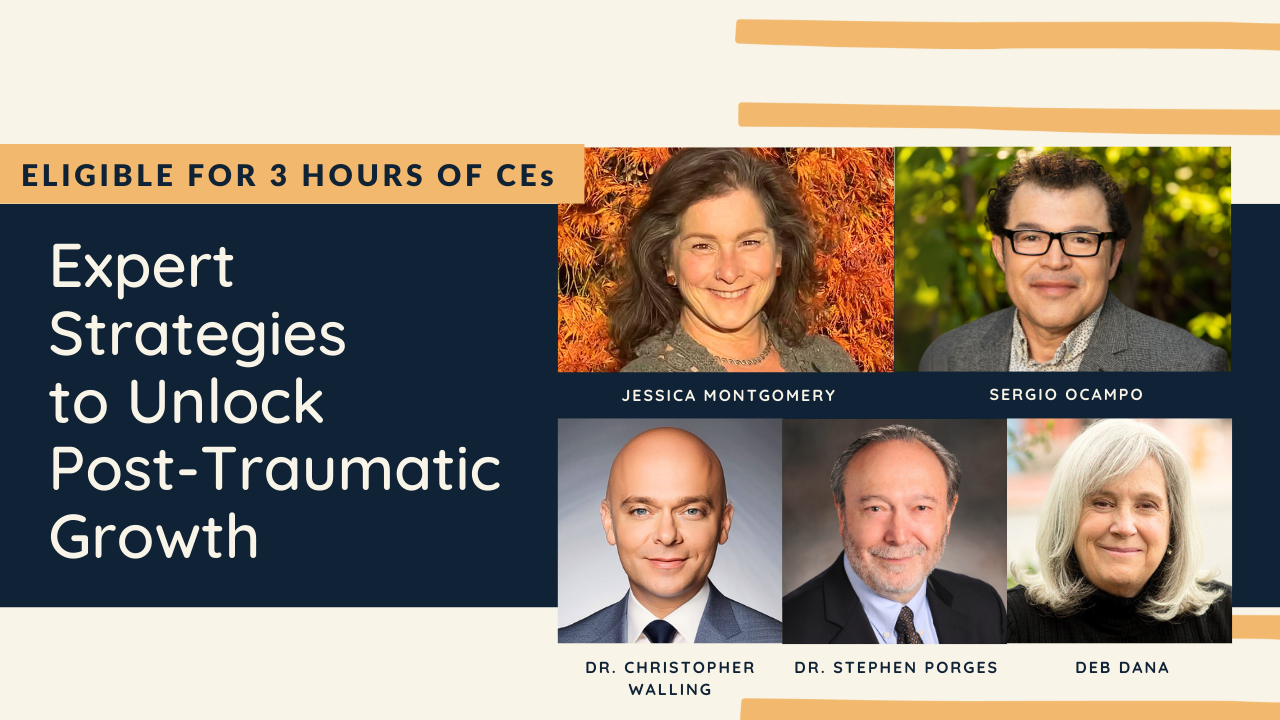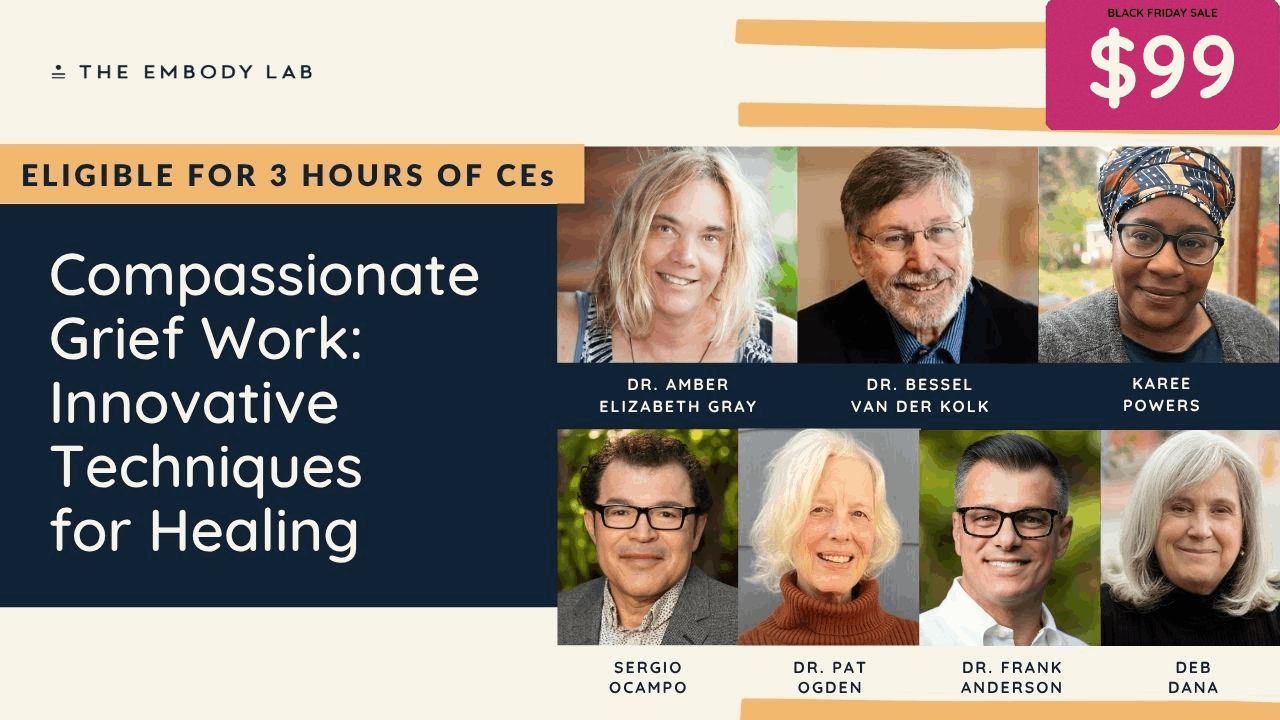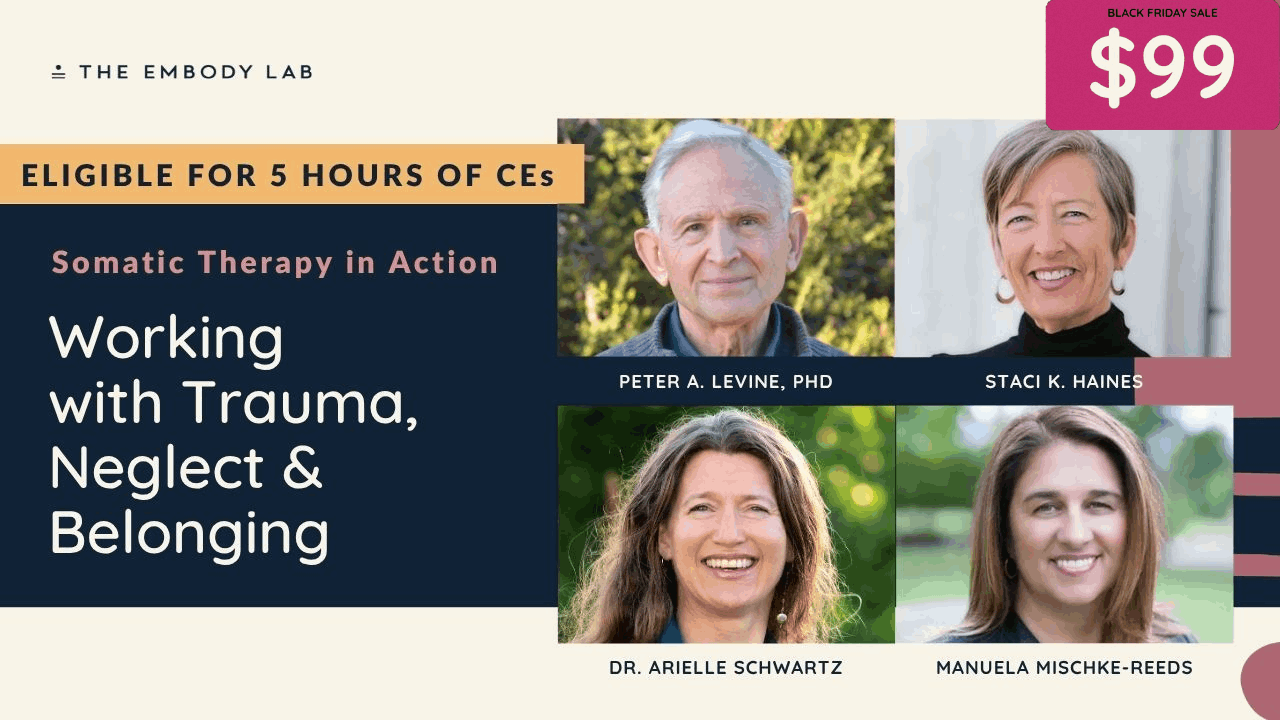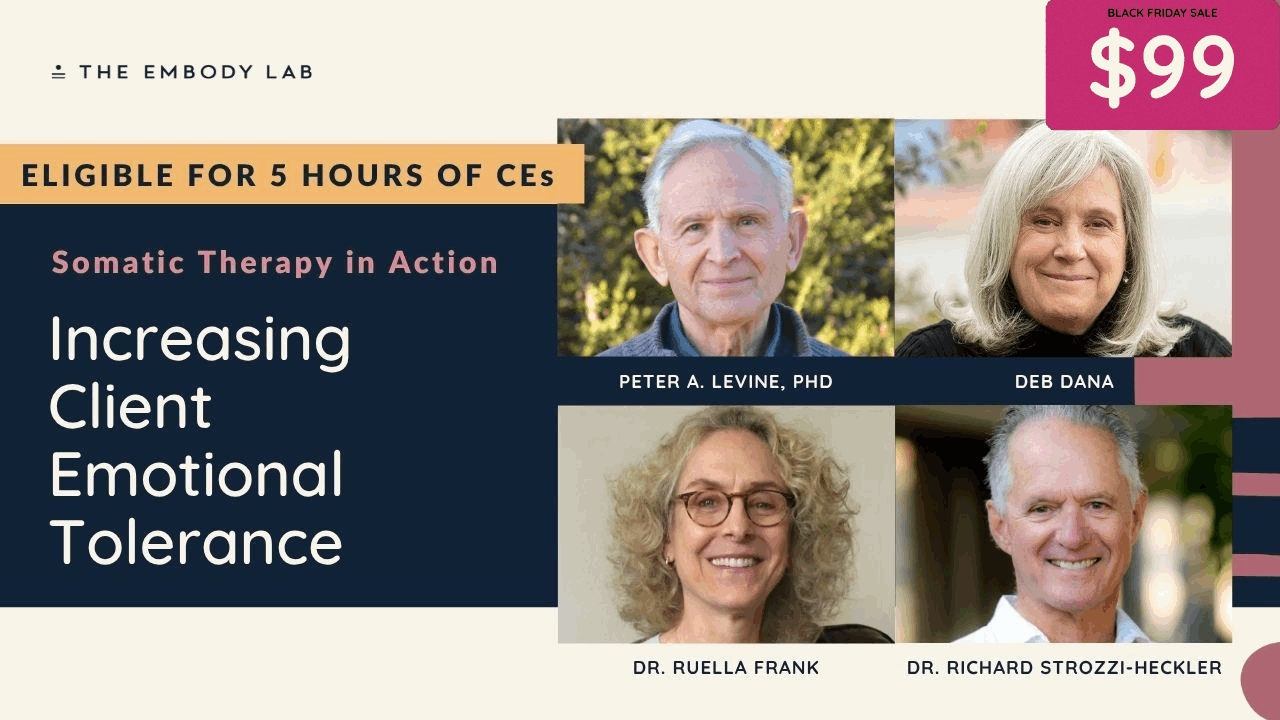
Expert Strategies to Unlock Post-Traumatic Growth
$447 USD $247
On-Demand Course Length: 3 Hours
"Expert Strategies to Unlock Post-Traumatic Growth," redefines trauma not just as an event, but as lingering somatic symptoms, focusing on restoring choice and vitality through body-based practices. It introduces the five core factors of post-traumatic growth, emphasizing that true growth involves embracing new possibilities and a profound appreciation for life after resolving traumatic experiences. Through practical techniques like coherence breathwork, somatic resourcing, and self-supportive contact interventions, the program facilitates neurophysiological regulation and helps re-pattern implicit memories. UltiMatély, this package empowers individuals to move beyond trauma-organized responses, fostering a more open, resilient self and embracing the transformative potential of their experiences.
ADD TO CARTAbout this course
Expert Strategies to Unlock Post-Traumatic Growth
In the aftermath of trauma, clients often feel broken, stuck, or unsure if they'll ever feel whole again. But what if healing could be about more than symptom relief or returning to how things were? This transformative course, led by Dr. Scott Lyons, founder of the Embody Lab, reveals how trauma—while fracturing—can become a catalyst for greater depth, clarity, and resilience when met with the right support. This is post-traumatic growth: not just surviving, but discovering new ways of being, new possibilities, and profound appreciation for life itself.
Beyond Symptom Management:
This isn't about bypassing pain or forcing silver linings. It's about creating conditions in the body, in the nervous system, and in relationship where transformation can naturally emerge. This experiential course guides practitioners who want to offer clients more than management—who want to guide them toward the possibility of becoming more whole, more alive, and more themselves. Because while trauma may be fracturing, healing has the power to reshape.
What You'll Learn:
Through expert teaching and practical strategies across three comprehensive modules, you'll discover how to:
Module 1: Somatic Psychology of Post-Traumatic Growth with Dr. Christopher Walling
Understanding Post-Traumatic Growth:
- Define PTG as finding new ways of being and possibilities that emerge through and from trauma
- Move beyond mere survival to genuine transformation
- Understand that growth involves grieving old structures
- Accept that trauma fundamentally alters one's being, leading to new, transformed existence
- Recognize PTG as permanent change, not return to previous state
The Five Core Factors of PTG:
- Restored appreciation for life itself
- Capacity for improved relating to others (genuine compassion, shared vulnerability)
- Engagement in acts of service and altruism
- Finding spiritual meaning and deeper philosophies
- Development of new perspectives and capacities from overcoming adversity
Reframing Trauma and Recovery:
- Understand trauma not solely as event, but as lingering somatic symptoms
- Recognize how trauma diminishes sense of choice
- Focus recovery on restoration of choice and access to vitality
- Move beyond simple symptom reduction to genuine growth
Practical Techniques:
- Apply coherence breathwork for neurophysiological regulation
- Use somatic resourcing to build capacity
- Implement yoga-based strategies for traumatic stress
- Re-pattern implicit memories (rather than "discharge")
- Foster resilience through body-based interventions
Measuring Growth:
- Understand Post-Traumatic Growth Inventory (21-item validated instrument)
- Use psychometrics to evaluate client capacity for growth
- Assess progress across five identified factors
- Track transformation following stressful encounters
Module 2: Somatic Pathways to Post-Traumatic Growth with Sergio Ocampo
The Body's Role in Growth:
- Understand PTG as positive psychological change after resolving trauma
- Recognize how trauma affects mind and body's capacity to adapt, learn, and thrive
- See how nervous system contracts after trauma, limiting potential for expansion
- Work with the somatic aftermath as paramount to growth
Mobilizing Trapped Charge:
- Engage body-based practices to mobilize stuck emotional charge
- Use somatic therapy to resolve overwhelming experiences
- Support completion of trauma responses through the body
- Move trapped energy toward resolution
Self-Supportive Contact Interventions:
- Apply brain support contact techniques
- Use thoracic and cardio-thoracic support
- Implement gentle gazing practices
- Settle and contain autonomic nervous system
- Resource the vagal complex for immediate internal regulation
Opening to Greater Capacity:
- Support development of more open and resilient self
- Foster growth beyond original baseline (even more than what one was born with)
- Cultivate increased curiosity
- Facilitate deeper experience of being alive
- Understand how resolution creates expansion
Module 3: Embracing Post-Traumatic Growth - Experience, Safety, and Grief with Jessica Montgomery
Emergence of New Ways of Being:
- Recognize how new opportunities emerge as trauma is processed and released
- Support engagement with life in expanded ways
- Define PTG as new definitions of life arising through and from trauma
- Facilitate transition from survival to thriving
Three Key Areas for Recalibration:
1. Embracing Fullness of Direct Experience:
- Use curiosity and awareness to explore wider range of perception
- Integrate novel sensations as trauma resolves
- Distinguish excitement and pleasure from fear
- Apply movement orientations to engage life beyond automatic trauma responses
- Move from limited fight/flee/freeze to wider human capacity
2. Recalibrating Relationship with Safety:
- Facilitate discernment of safety in present moment
- Recognize subtle somatic cues of safeness
- Support conscious engagement with environment
- Move from automatic threat response to intentional assessment
- Use mindful somatic sensing to discern present-moment reality
3. Navigating Organic Grief:
- Support grief process for what trauma has cost
- Validate organic nature of sorrow for losses
- Recognize and repair losses from living with trauma
- Employ creative rituals to honor past sacrifices
- Use storytelling to reweave personal narratives
- Honor what was lost while opening to what's possible
Building Resilient Nervous System:
Based on insights from Deb Dana (special guest):
- Understand resilience as having pathways back to regulation after dysregulation
- Create capacity to process suffering from anchor in regulation (not get hijacked)
- Remember rather than relive traumatic experiences
- Build foothold in ventral vagal state to process survival states
- Develop pathways through repeated practice
Creating Resource Menus:
- Identify what brings moments of ventral regulation (places, people, objects, memories)
- Build personalized menu of resources
- Strengthen pathways through repeated use
- Individualize approach for each nervous system
- Use sensory anchors (fragrances, music, nature, memories)
- Practice reaching for resources to build resilience
Core Principles Across All Modules:
From Survival to Expansion:
- Help clients move beyond survival into genuine growth
- Support emergence of new capacities and perspectives
- Foster depth, clarity, and resilience
- Guide toward greater wholeness and aliveness
Somatic Foundation:
- Work through body, not just mind
- Address nervous system directly
- Use body-based practices for regulation
- Support completion of trauma responses
- Build capacity through embodied techniques
Integration and Coherence:
- Help clients integrate trauma into coherent life story
- Support what was "stuck and separated" in survival states
- Prevent experiences from remaining frozen
- Facilitate safe revisiting for integration
- Build coherence across experience
Honoring the Process:
- Acknowledge that growth involves grief for old structures
- Validate that trauma fundamentally changes who we are
- Support acceptance of permanent transformation
- Honor what was lost while celebrating what emerges
- Recognize growth is not return to previous state
Expert Faculty:
Learn from Dr. Christopher Walling, Sergio Ocampo, and Jessica Montgomery, with golden nuggets of wisdom from special guests Dr. Stephen Porges and Deb Dana—pioneers in understanding trauma, nervous system regulation, and post-traumatic growth.
What Makes This Course Unique:
This isn't theory about post-traumatic growth—it's practical, experiential training in how to:
- Create conditions where growth naturally emerges
- Work somatically with trauma's lingering effects
- Build nervous system resilience through pathways to regulation
- Support clients in discovering capacities beyond their original baseline
- Navigate the grief that's essential to growth
- Measure and track genuine transformation
The Five Dimensions of Growth:
Watch for and cultivate these transformative shifts in clients:
- Appreciation for Life: Deeper gratitude and value for existence itself
- Relating to Others: Enhanced compassion, vulnerability, connection
- Service and Meaning: Engagement in altruism and spiritual depth
- Personal Strength: Discovery of new capacities and resilience
- New Possibilities: Recognition of opportunities invisible before trauma
From Deb Dana's Wisdom:
Post-traumatic growth, at its core, is about building a resilient nervous system—one that can dysregulate and find its way back. It's not about staying in regulation all the time, but about having pathways to return so we can process what's held in survival states from a place of safety. Every time we use a resource that anchors us in regulation, we strengthen that pathway. This is how we build resilience: not spontaneously, but through intentional practice of creating and traveling pathways back to regulation.
Transformation Through Growth:
This course supports professionals in helping clients:
- Move from broken to transformed (not just back to baseline)
- Access vitality and choice that trauma diminished
- Process and integrate traumatic experiences safely
- Develop capacities that exceed pre-trauma functioning
- Find meaning, connection, and appreciation for life
- Grieve losses while opening to new possibilities
- Build resilient nervous systems with reliable pathways to regulation
- Discover they can be more whole, alive, and themselves than ever before
Who This Is For:
Essential training for:
- Therapists working with trauma survivors
- Practitioners wanting to move beyond symptom management
- Clinicians interested in positive psychology and growth
- Somatic practitioners deepening trauma-informed practice
- Anyone supporting clients through post-traumatic integration
- Professionals seeking evidence-based approaches to PTG
- Practitioners wanting to measure and track client growth
Core Truth:
Trauma may be fracturing, but healing has the power to reshape. With the right support—somatic awareness, nervous system regulation, grieving of losses, and recalibration of safety—clients don't just return to who they were. They discover new ways of being, new possibilities, and a deeper appreciation for life itself. They become, paradoxically, more whole through having been broken. This is the promise of post-traumatic growth.
This course provides the expert strategies, practical tools, and somatic understanding to guide clients not just through trauma, but toward the transformation that becomes possible on the other side—when we create conditions in the body, nervous system, and relationship where natural growth can emerge.
Join our brilliant experts for the following sessions:
DR. CHRISTOPHER WALLING
Dr. Chris Walling, PsyD, MBA, FABP is a licensed clinical psychologist, board-certified psychoanalyst, and an active leader in the bio-behavioral sciences. Dr. Walling is an Associate Professor in the Department of Research Psychology at the California Institute of Integral Studies, and the Research Chair & Past-President of the United States Association for Body Psychotherapy. He is a Fellow of the American Board of Psychoanalysis and a member of the New Center for Psychoanalysis where he serves as Faculty in the Adult Psychoanalytic Training program and serves on their Education Committee & Diversities Committee, Dr. Walling also serves on the American Psychoanalytic Association’s Committee on Gender & Sexuality.
Dr. Walling serves as a Clinical Research Fellow at the Kinsey Institute for Research on Sex, Gender and Reproduction, located at Indiana University, Bloomington. In addition, he has been honored as a Gina Ogden Curatorial Scholar for 2024 by Kinsey, where he also serves on their International Advisory Council. His clinical interests survey the fields of somatic psychotherapy, relational psychoanalysis, human sexuality, and trauma psychology. His peer-reviewed works are published in the American Psychological Association‘s Journal of Psychotherapy and the International Body Psychotherapy Journal. Dr. Walling maintains a private practice in Brentwood (Los Angeles), California.
DEB DANA
Deb Dana, LCSW is an author, clinician, and consultant specializing in using the lens of Polyvagal Theory to understand and resolve the impact of trauma and create ways of working that honor the role of the autonomic nervous system. She developed the Rhythm of Regulation Clinical Training Series and lectures internationally on ways Polyvagal Theory informs work with trauma survivors. She is a founding member of the Polyvagal Institute, clinical advisor to Khiron Clinics, and an advisor to Unyte.
Deb’s clinical work published with W.W. Norton includes The Polyvagal Theory in Therapy: Engaging the Rhythm of Regulation, Polyvagal Exercises for Safety and Connection: 50 Client Centered Practices, and the Polyvagal Flip Chart. She partners with Sounds True to bring her polyvagal perspective to a general audience through the audio program Befriending Your Nervous System: Looking Through the Lens of Polyvagal Theory and her forthcoming print book Anchored: How to Befriend Your Nervous System Using Polyvagal Theory.
To learn more, visit rhythmofregulation.com or polyvagalinstitute.org
JESSICA MONTGOMERY
Jessica Montgomery, MSW, Certified Hakomi Trainer, has been a somatic counselor and catalyst for more than 30 years. Blending brain science with mindful experiential techniques and profound regard for the unbroken wisdom within, Jessica facilitates individuals, couples and communities toward greater wholeness. Her background includes work in community mental health, private practice, retreats and international pilgrimages, integrative medicine, counselor and bodyworker education and the use of ritual for personal growth. A graduate of Reed College and Portland State University, she is both thankful and critical of traditional academics and fiercely committed to anti-oppression practices in mental health. Jessica is a Trainer at the Hakomi Institute of the Pacific Northwest and has been on faculty at the National University of Natural Medicine, the META Institute, Sacred Journeys, the Pacific Center for Awareness and Bodywork, and served for five years as program director at Breitenbush Retreat and Conference Center. As co-developer of the Primary Attachment model, she supports practitioners in developing greater capacity for professional intimacy. A passionate communicator, Jessica is skilled at synthesizing key information across disciplines, inspiring embodied approaches to personal and social evolution. She lives in a small house on a tall hill in Portland Oregon where she practices aerial yoga, kitchen witching and the art of effing the ineffable.
Website: www.jessicamontgomerycounseling.com
SERGIO OCAMPO
Sergio Ocampo is co-developer and instructor of Dynamic Somatic Touch (DST), an innovative and highly effective trauma resolution approach effective in unwinding emotional overwhelm, trauma, and physical syndromes such as chronic illness and pain. Based on the core values of somatic therapies, psychotherapy and body based sciences, DST complements and accelerates healing for all phases of trauma work.
Sergio combines somatic and cognitive interventions, including Somatic Experiencing, DST, Family Systems, Generational Trauma Resolution, Dream Work, Depth and Spiritual Psychology, Spiritual Awareness, and EMDR, to deliver innovative therapeutic approaches.
Sergio serves as a Somatic Experiencing Practitioner, Licensed Psychotherapist, Antioch University Adjunct faculty, and Embody Lab content contributor, while also holding leadership positions in Somatic Experiencing International and Dr. Peter Levine’s Ergos Institute of Somatic Healing. Fluent in four languages, Sergio advocates for seeing anxiety and depression as temporary. Sergio’s motto is: Emotional suffering and trauma are not a life sentence, but a temporary discomfort.
Websites: www.sergioocampo.com, www.dynamicsomatictouch.com
DR. STEPHEN PORGES
Stephen W. Porges, PhD is a Distinguished University Scientist at Indiana University, where he is the founding director of the Traumatic Stress Research Consortium. He is professor of psychiatry at the University of North Carolina and professor emeritus at the University of Illinois at Chicago and the University of Maryland. He served as president of the Society for Psychophysiological Research and the Federation of Associations in Behavioral & Brain Sciences and is a former recipient of a National Institute of Mental Health Research Scientist Development Award. He has published more than 400 peer‐reviewed scientific papers that have been cited in more than 50,000 peer-review publications. He is the creator of the Polyvagal Theory and a music-based intervention, the Safe and Sound Protocol ™, currently used by approximately 3,000 therapists to reduce hearing sensitivities, improve language processing, and increase spontaneous social engagement. He is the author of The Polyvagal Theory: Neurophysiological foundations of Emotions, Attachment, Communication, and Self-Regulation (Norton, 2011), The Pocket Guide to the Polyvagal Theory: The Transformative Power of Feeling Safe (Norton, 2017), and Polyvagal Safety (Norton, 2021), as well as co-author with Seth Porges of Our Polyvagal World: How Safety and Trauma Change Us (Norton, 2023), and co-editor with Deb Dana of Clinical Applications of the Polyvagal Theory: The Emergence of Polyvagal-Informed Therapies (Norton, 2018). Dr. Porges is a founder of the Polyvagal Institute and co-creator with Anthony Gorry of Polyvagal Music, a new musical genre that uses music to entrain the endogenous neurophysiological rhythms that support homeostatic functions.
Website: www.stephenporges.com
DR. SCOTT LYONS
Dr. Scott Lyons is a licensed holistic psychologist, educator and author of the book Addicted to Drama: Healing Dependency on Crisis and Chaos in Yourself and Others, with Hachette publishing. Scott is also the host of The Gently Used Human Podcast, a delightfully depthful and often hilarious exploration of what it is to be human, to have lived life, and come out gently used.
As a renowned body-based trauma expert, Doctor of Osteopathy (Spain) and Mind-Body Medicine specialist, Scott helps people to break free from cycles of pain, limited beliefs, and trauma. Scott is an innovator in transformative wellness and trauma therapy, teaching over half a million people internationally over the past twenty years how to relieve stress and restore vitality. Scott has worked with many of the country’s top leaders and CEOs as an executive coach and wellness consultant.
Scott is the creator of The Embody Lab—the largest online learning platform for body-based trauma therapies—and developer of Somatic Stress Release™, a holistic process of restoring biological resilience, taught in over 20 countries.
Scott is a Certified Body-Mind Centering™ Teacher and Practitioner, Cranio-Sacral Therapist, Visceral Manipulation Therapist, Neuro-Developmental Therapist, Infant Developmental Movement Educator, Registered Movement Therapist and Educator, Trauma Therapist, Somatic Experiencing Practitioner, Thai Massage Practitioner, Clinical Hypnotherapist, Mindfulness-based Executive Coach, Experiential Anatomy/ Developmental Movement and Yoga Practitioner, and a 500-hour registered yoga teacher. Additionally Scott holds a BFA in Theater/Psychology, MFA in Dance/Choreography, MS in Clinical Psychology, and a PhD in Clinical Psychology and Mind-Body Medicine.
Scott has been featured in The New York Times, Vanity Fair, Forbes Women, Fast Company, The Telegraph, The Guardian, INC., CNBC Make It, Fortune, Bustle, Reader’s Digest and Goop. He has also appeared on The Mel Robbins Podcast, The Jordan Harbinger Show, The We Can Do Hard Things Podcast, The Mental Illness Happy Hour, The Human Upgrade, The Genius Life, and The Chopra Well.
Websites: www.TheEmbodyLab.com, www.drscottlyons.com
Instagram: @DrscottLyons

Guided full-length demonstrations
Observe four full-length somatic therapy sessions with clients. Each demonstration has a detailed breakdown and guided reflections of the session.

Powerful tools for your practice
In each session, the facilitator will walk you through what they did, why they did it, and how to adapt the same tools to your own practice.

Learn on your schedule
Get lifetime access to all your sessions. Download videos, audio files, and complete transcripts. Learn anywhere, anytime, on your schedule.
Learn more about this course
What Customers Are Saying
Sofia M.
"This gave me a new lens on trauma, not just survival, but transformation. Truly life-affirming work."
Andre C.
"I now support clients in building resilience, not just coping. The body-based tools are game-changers."
Rina T.
"Such a rich and hopeful course. It helped me reframe trauma and guide deeper healing."
Other Courses

Compassionate Grief Work: Innovative Techniques for Healing
$447 $99
Approach grief as a sacred process. This course offers somatic and creative techniques including ritual, therapeutic letters, and breathwork to help clients move through loss, embody mourning, and transform their relationship with absence.

Somatic Therapy in Action: Working with Trauma, Neglect & Belonging
$447 $99
Explore powerful somatic therapy sessions addressing trauma, neglect, and belonging. Witness transformative journeys through cultural trauma, self-doubt, abandonment, and deep-seated fear. Learn practical somatic techniques including movement, vocalization, imagery, and co-regulation to foster emotional healing, self-connection, and empowerment.

Somatic Therapy in Action: Increasing Client Emotional Tolerance
$447 $99
Enhance your practice with powerful somatic demonstrations focused on nervous system regulation, trauma healing, and building emotional resilience. Explore anxiety, medical trauma, hyperarousal, and stored trauma through body-based awareness, imagery, and therapeutic presence.
List your practice on The Embody Lab’s Somatic Therapist & Practitioner Directory!
More somatic therapy seekers come to The Embody Lab in their search for the right therapist than to any other somatic therapy site. We’ll help your practice be seen by hundreds of thousands of potential clients seeking your services.
Join The Directory Here

